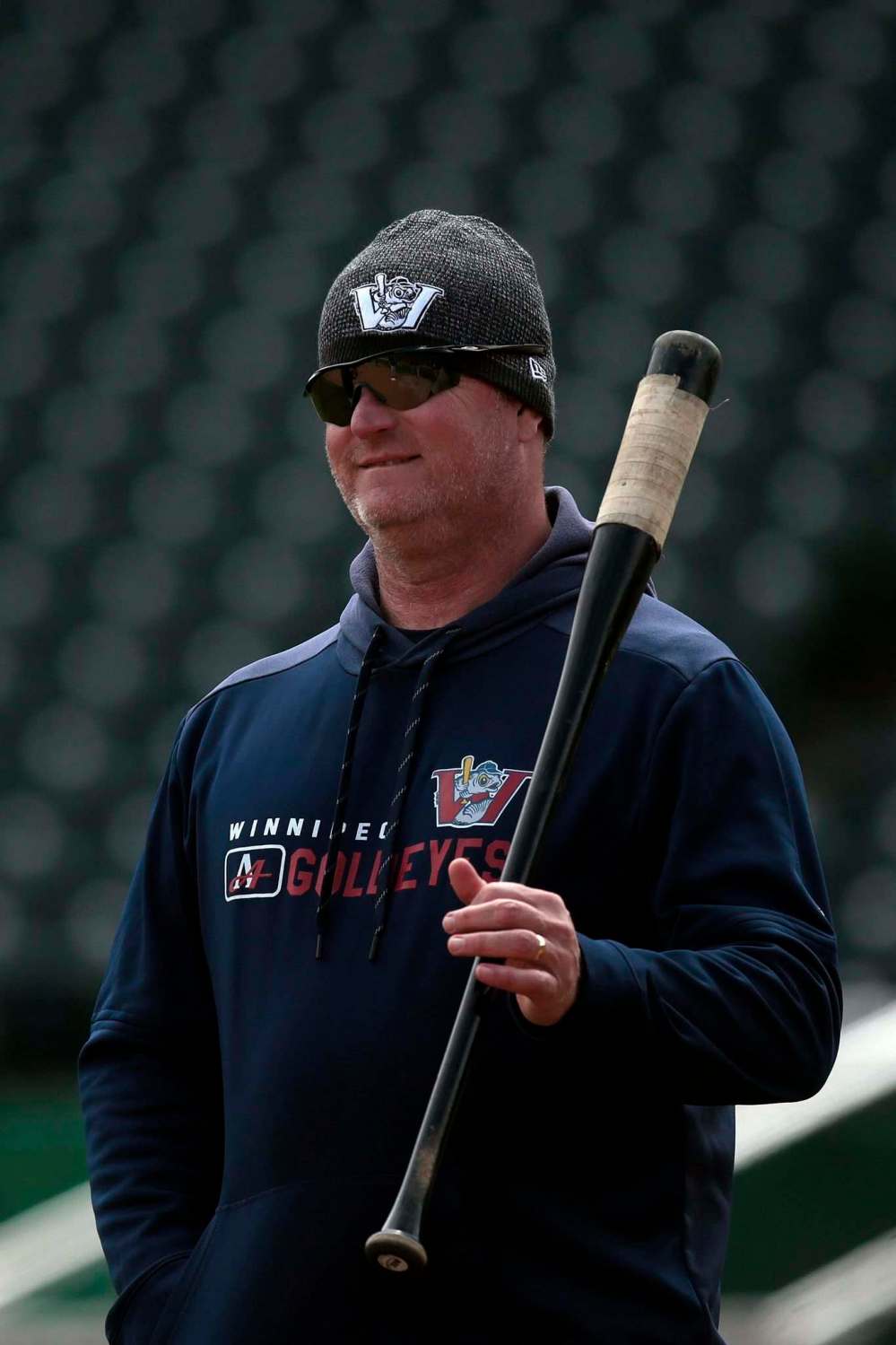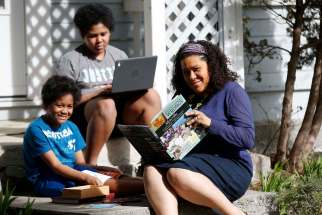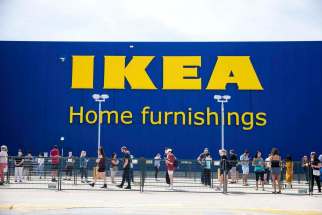Return of pro sports a Herculean task Getting all stakeholders on same page near impossible
Read this article for free:
or
Already have an account? Log in here »
To continue reading, please subscribe:
Monthly Digital Subscription
$0 for the first 4 weeks*
- Enjoy unlimited reading on winnipegfreepress.com
- Read the E-Edition, our digital replica newspaper
- Access News Break, our award-winning app
- Play interactive puzzles
*No charge for 4 weeks then price increases to the regular rate of $19.00 plus GST every four weeks. Offer available to new and qualified returning subscribers only. Cancel any time.
Monthly Digital Subscription
$4.75/week*
- Enjoy unlimited reading on winnipegfreepress.com
- Read the E-Edition, our digital replica newspaper
- Access News Break, our award-winning app
- Play interactive puzzles
*Billed as $19 plus GST every four weeks. Cancel any time.
To continue reading, please subscribe:
Add Free Press access to your Brandon Sun subscription for only an additional
$1 for the first 4 weeks*
*Your next subscription payment will increase by $1.00 and you will be charged $16.99 plus GST for four weeks. After four weeks, your payment will increase to $23.99 plus GST every four weeks.
Read unlimited articles for free today:
or
Already have an account? Log in here »
Hey there, time traveller!
This article was published 19/05/2020 (2033 days ago), so information in it may no longer be current.
It’s the most memorable scene from one of the greatest sports movies of all time. Tom Hanks, playing the role of a frustrated former Chicago Cubs slugger-turned-reluctant manager Jimmy Dugan in A League of Their Own, turns to his emotional troops and tells them, “There’s no crying in baseball.”
It’s a purely fictional rule, of course, but one that has stood the test of time and become part of the fabric of the game. Now, nearly three decades after Penny Marshall’s classic film hit theatres, comes a lengthy list of very real no-nos that I suspect will have plenty of modern-day players feeling a bit weepy.
No spitting. No sunflower seeds. No fist bumps or high-fives. No saunas, steam rooms, pools or cryotherapy chambers. No touching your face or licking your fingers. No clubhouse buffets, dining in restaurants on the road or fancy in-flight catering. No hitting up your favourite watering hole. No hotel fitness centres. No Ubers.
Welcome, folks, to pro sports in a COVID-19 world.
The extensive return-to-play guidelines, laid out by Major League Baseball in a 67-page operations manual, offer a fascinating glimpse into the hurdles leagues face in trying to get back on the field, or the rink, in the middle of a global pandemic where a coronavirus without a vaccine has already led to more than 4.8 million cases and 319,000 deaths.
To get the all-clear to play from local and federal health officials and governments, substantial changes are required to minimize risk. Baseball, aiming for an early July start to its delayed season, is the first to have its plans go public. The NHL and NBA are still working on how they would resume their paused seasons, with details expected soon.
My advice: take all these protocols and promises to follow them with a massive grain of salt.
“No sunflower seeds?” a somewhat incredulous St. Louis Cardinals shortstop Paul DeJong told USA Today this weekend. “I don’t know how sustainable all these ideas are. Some of these things are crazy, and are hard to enforce. This could be an infrastructure nightmare.”
Therein lies the rub. You can put all the restrictions on paper that you want, but good luck getting hundreds of multimillionaire athletes to follow them once the action gets underway, in addition to actually enforcing them. Especially in baseball, where cutting corners and cheating are pretty much engrained in the sport’s DNA.
Old habits die hard, and I suspect many of them won’t actually go away at all.

“Impossible,” longtime Winnipeg Goldeyes skipper Rick Forney told me Tuesday when I asked how all these changes, which he described as “very excessive,” could realistically be woven into the game at the highest level.
He’s right, too. Just look at what happened in Germany last weekend, where the Bundesliga resumed play in empty soccer stadiums — and league guidelines were almost immediately disregarded. Several members of Hertha openly celebrated their three goals in a victory over Hoffenheim, including group hugs and even one player kissing his teammate.
“Goal celebrations are part of football. We have been tested frequently and that’s why I believe this should be allowed. It would be a shame if you weren’t even allowed to celebrate, even more would be destroyed,” Hertha manager Bruno Labbadia told ESPN in defending the clear defiance by his players.
The league said Monday there would be no punishment, but reminded all clubs of the importance of following guidelines. Yeah, I’m sure they’ll really, REALLY take them seriously the next time around.
An entire team (Dynamo Dresden) is currently in the middle of a 14-day quarantine after two members tested positive for COVID-19 while they were training together. And the manager of another squad, FC Augsburg, had to miss the team’s first match back last weekend after he broke strict quarantine rules by leaving his hotel to buy toothpaste from a store.
I’d expect similar situations in any leagues that find a way to resume play. You get the feeling this could all go sideways rather quickly.
“Once we get into the season, I think things should get back to normal. I just feel like if we pass the exam and the daily testing, we should act freely in the clubhouse and on the field, and have fun,” said DeJong.
Some baseball players are questioning whether it’s all worth it, especially given that their salaries are going to be reduced due to a shortened schedule and loss of revenues associated with having no fans present. Tampa Bay Rays pitcher Blake Snell, who would be paid just more than US$3.5 million this season instead of US$7 million, is the most outspoken so far, claiming he’d be risking his life and won’t play for a penny less than his full salary. And, I suspect, the right to spit some seeds.
“If I get the ’rona, guess what happens with that? Oh, yeah, that stays — that’s in my body forever,” the 27-year-old said. “Y’all got to understand… for me to take a pay cut is not happening because the risk is through the roof, it’s a shorter season, less pay. I’ve got to get my money. I’m not playing unless I get mine, OK?”
Snell won’t get much sympathy from the majority of the public, who can’t fathom the kind of money he makes to take the mound every fifth day and throw a baseball really hard — especially since so many fans are suffering their own pay cuts, or outright loss of employment, as a result of the current economic climate.
But there’s certainly risk, especially to the lower-paid non-athletes whose work is vital to any league getting off the ground: the list includes equipment managers, hotel workers, bus drivers, food servers, pilots and airport employees.
“I’m all down for starting everything back up, let’s rock. But what if someone gets sick and dies? It’s awful to think about, but still,” Toronto Maple Leafs forward Mitch Marner said last week.
All of which underscores why leagues have taken so long to announce exactly how this would work as they attempt to find a way to reduce massive financial losses by satisfying existing broadcast agreements. Getting all the stakeholders on the same page is a Herculean task. Perhaps impossible.
If that’s the case and sports remain on hiatus, I suspect even old Jimmy Dugan might be balking at his own advice and shedding a tear or two.
mike.mcintyre@freepress.mb.ca
Twitter: @mikemcintyrewpg

Mike McIntyre grew up wanting to be a professional wrestler. But when that dream fizzled, he put all his brawn into becoming a professional writer.
Our newsroom depends on a growing audience of readers to power our journalism. If you are not a paid reader, please consider becoming a subscriber.
Our newsroom depends on its audience of readers to power our journalism. Thank you for your support.






